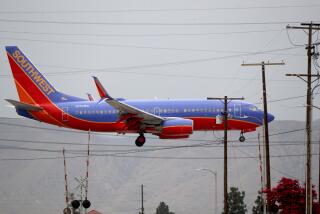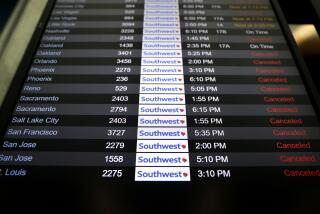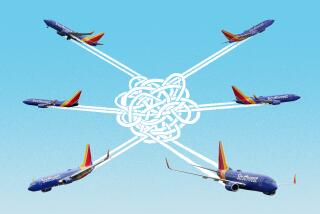PSA Lists $11.8-Million Loss : Firm Blames Showing on Airline Fare War
SAN DIEGO — Blaming an ongoing airline fare war, PSA Inc., the parent of Pacific Southwest Airlines, on Tuesday reported an $11.8-million net first-quarter loss on revenues that rose 25% to $212 million.
“This (loss) isn’t totally unexpected,” said PSA Inc. spokeswoman Margie Craig, who added that, because of shrinking profit margins caused by fare wars, most of the nation’s airlines have been reporting first-quarter losses.
Pacific Southwest Airline’s operating loss of $10.3 million was partly sparked by bad weather in the Pacific Northwest that forced flight cancellations and was made worse by costs associated with the addition of seven new destinations, according to Craig. The airline also absorbed higher-than-usual maintenance costs.
Although PSA’s non-airline operations generated a $1.4-million loss, most reported “improved” results, Craig said. However, those gains were partially offset by a $900,000 loss produced by the PSA’s acquisition of a controlling interest in Statex Petroleum Inc.
PSA recorded a $5.2-million non-operating loss caused by a strong Japanese yen that adversely affected PSA’s debt payments.
PSA’s airline operations recorded a $6.1-million net profit and PSA Inc. recorded a $448,000 net loss during the same quarter a year ago.
PSA’s seven-city expansion that was completed in December boosted PSA’s available passenger miles total by 39% to 14 million miles. But Craig said: “We always knew we’d have to pay for that expansion and this (loss) is part of the payment.”
The San Diego-based company added 15 airplanes to its fleet during the past year, and increased its employee ranks by 29% to 4,626. Although the airline added some pilots and flight attendants, the bulk of PSA’s new employees were hired to operate ground stations at the airline’s seven new destinations, Craig said.
Although PSA benefited from fuel costs that declined “marginally” from an average of 87.2 cents per gallon to 82 cents per gallon during the first quarter, Craig said that the downward pricing trend will produce “substantial savings” during the remainder of the year.
More to Read
Inside the business of entertainment
The Wide Shot brings you news, analysis and insights on everything from streaming wars to production — and what it all means for the future.
You may occasionally receive promotional content from the Los Angeles Times.










